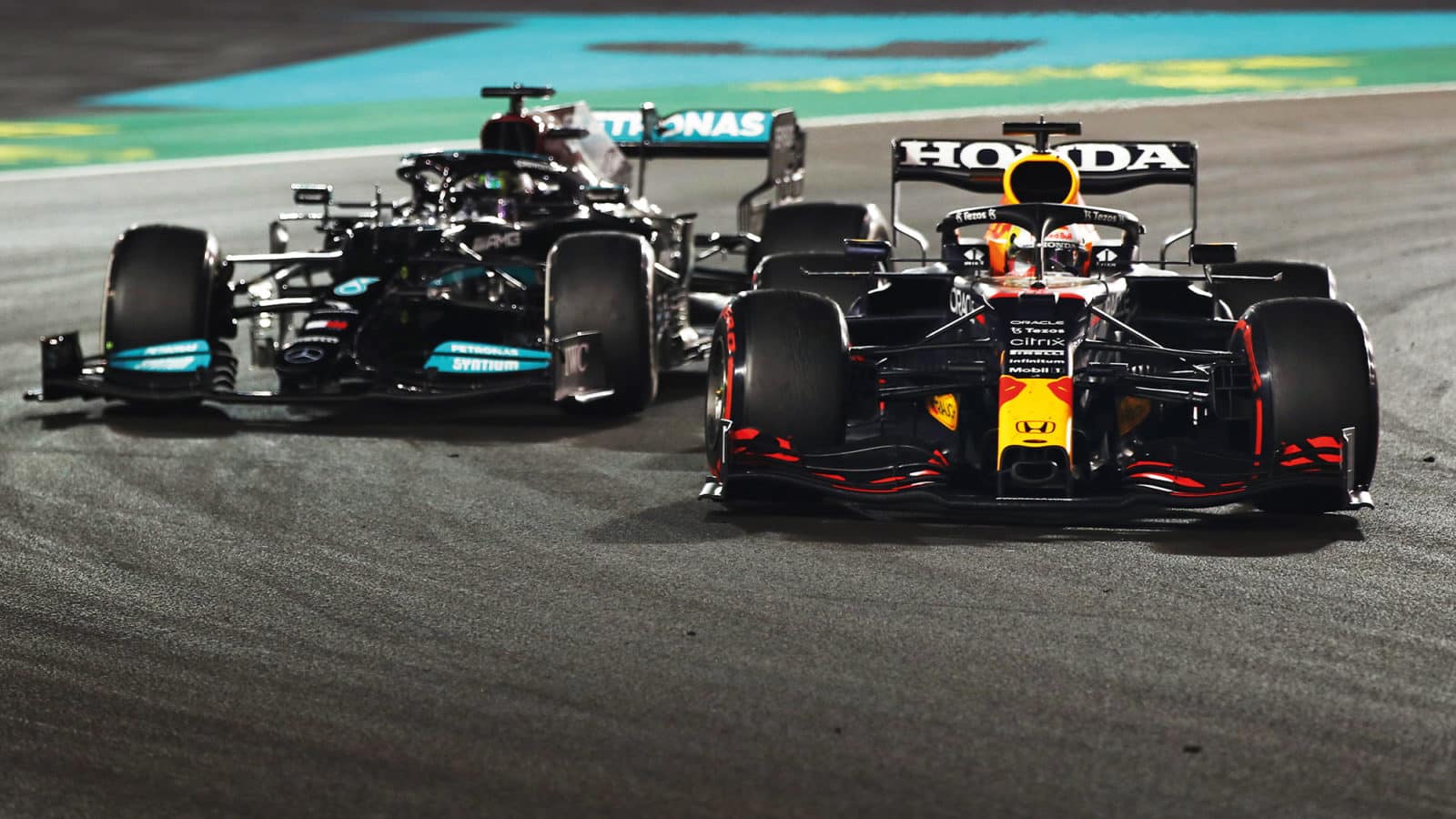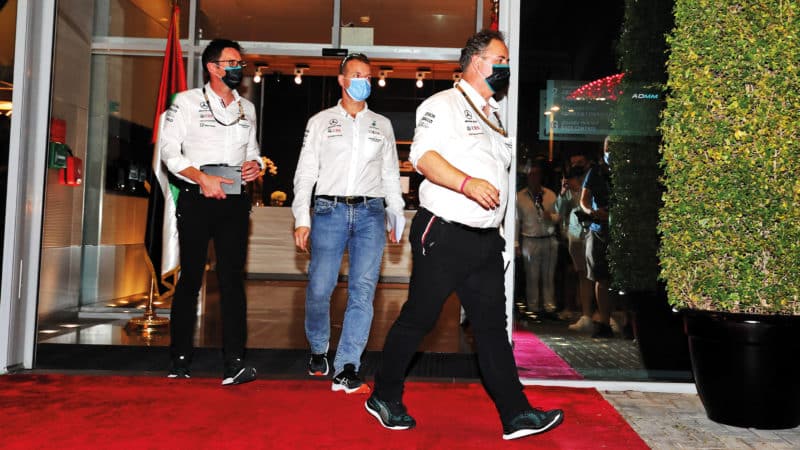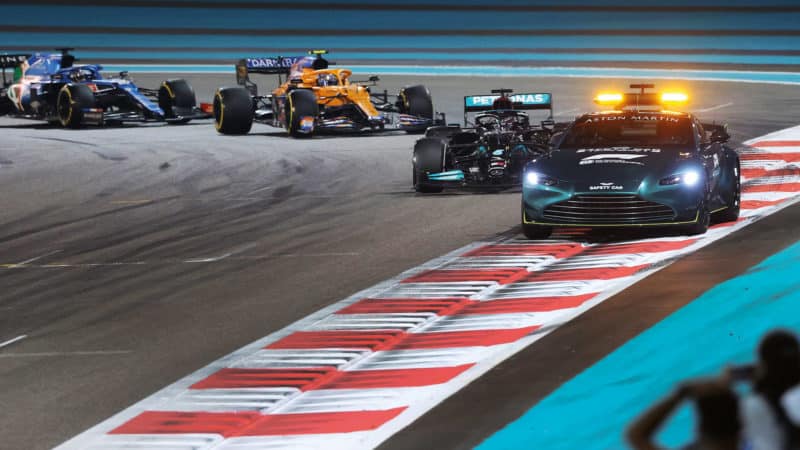F1’s moment of shame at the 2021 Abu Dhabi Grand Prix
Max Verstappen is undoubtedly a worthy champion but the season finale should have been handled differently. Mark Hughes has his say on the Michael Masi mess

A battle in the height of controversy: Verstappen passes Hamilton at Yas Marina's Turn 5 in 2021
Joe Portlock/F1 via Getty Images
In the end Mercedes withdrew its appeal contesting the result of the Abu Dhabi Grand Prix, but what happened there was wrong. There may be ways of justifying it with slippery wording, but fundamentally it was wrong to prioritise showbusiness over sporting integrity in the way the race was restarted.
With just one racing lap left, allowing the lapped cars between the old-tyred race leader Lewis Hamilton and his rival Max Verstappen – on fresh tyres around 2sec faster – to unlap themselves prepared the lamb to the slaughter as the safety car released them. A non-legitimate interpretation of the sporting regulations had changed the natural outcome of the race and the world championship. The identities of the beneficiary and the victim, and whatever luck or on-track injustices they’d endured through the season up to that point, is irrelevant. Those were all ‘natural’ racing outcomes. This, however, was not and it effectively invalidated the whole incredible contest, the battle which had brought them to the finale after 21 races equal on points.
“Masi is being set up to fail, but that doesn’t change the fact that in making that choice, he did fail”
Mercedes lodged a protest on the night, arguing that sporting regulation procedure had not been followed, that article 48.12 stated clearly that the safety car would come in a lap after any lapped cars had unlapped themselves. The stewards threw this out on the grounds that article 48.13 overrode 48.12 in that it “allows the race director to control the use of the safety car, which in our determination includes its deployment and withdrawal”. In other words, according to the stewards, it’s at the race director’s discretion to interpret whichever regulation he pleases to legitimise the actions he wishes to take and any regulation which contradicts that aim can be dismissed as subservient. He can, according to this interpretation by the stewards, decide which rules to apply and to vary them as he sees fit. That’s not a principle that’s ever previously been understood to be within the race director’s powers.
It is surely doubtful that Article 48.13 was drafted in a way to allow it to override the previous and operate independently of that regulation. The fact that it is within the same sub-section implies that it’s not independent of it and that it’s written from the perspective of 48.12 having been met. If 48.13 allows the race director to override any of the other articles within the article 48 section, then it implies he can decide all manner of things which have never previously been considered to be under his remit.

Mercedes got legal right after the race
Alamy
It’s too easy to make race director Michael Masi the bad guy, in that it was his decision to make a totally unprecedented interpretation of the sporting regulations. But Masi was trying to satisfy an impossible combination of demands put upon him. Among his general remit is one from Formula 1 itself – agreed to by all the teams – that wherever possible races shouldn’t end behind the safety car, that every effort should be made to get the cars actually racing to the chequered flag, even if it is only for one single lap.
That’s an understandable objective, but should that extend to subverting the existing regulations? Because that’s what he needed to do here in order to achieve that objective. While in the midst of trying to satisfy that demand, he was being lobbied in real time by the competing teams, by both the sporting directors and the team principals of each team. The chances of making every single call correctly, in a time-pressured situation, are surely slim. Yes, whatever decisions he made in those stressed few minutes and seconds can be post-hoc justified by picking and twisting at the wording of regulation – but at that point it begins to enter the world of Alice in Wonderland, where Humpty Dumpty says, “When I use a word it means just whatever I choose it to mean.”

The late safety car, and the race director’s choices, decided the title
Giuseppe Cacace/AFP via Getty Images
Masi is not only having to make decisions in real time in confusing circumstances while being bombarded by lobbyists, he is up against armies of people and computers in the teams looking at every possible scenario and fully informed in a way he cannot be. In between those moments of stress he might be helping marshals brush cement dust off the track. It’s too much. He is being set up to fail. But that doesn’t change the fact that in making that decision, he did fail. As the title implies, he’s there to direct the race, not dictate it.
It would be a nonsense to change the outcome of the title after the event. But this one was decided in a non-legitimate way by incorrect application of the FIA’s own sporting regulations. After such an amazing season it’s deeply sad. Either driver would have been fully deserving of the title and so closely matched were they that only the on-track vagaries of weather, traffic and the effect of the actions of other drivers would have separated them.
That’s just racing luck – as was Nicholas Latifi crashing when he did. But what followed invalidated the championship contest, the totting up of points to decide who is the champion. If you base a category around the premise of that totting up, and incorrect application of a regulation decides the outcome, then something is badly wrong. The imperative to be racing at the flag for the sake of drama was accorded so much disproportionate priority that it completely polluted the sporting integrity of the contest. We need a better balance than this.
